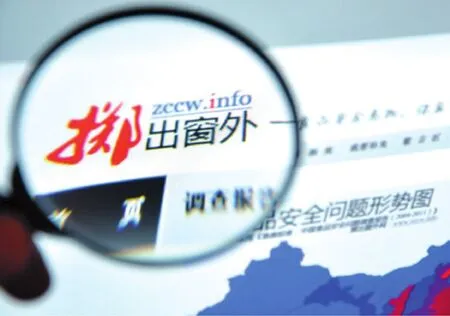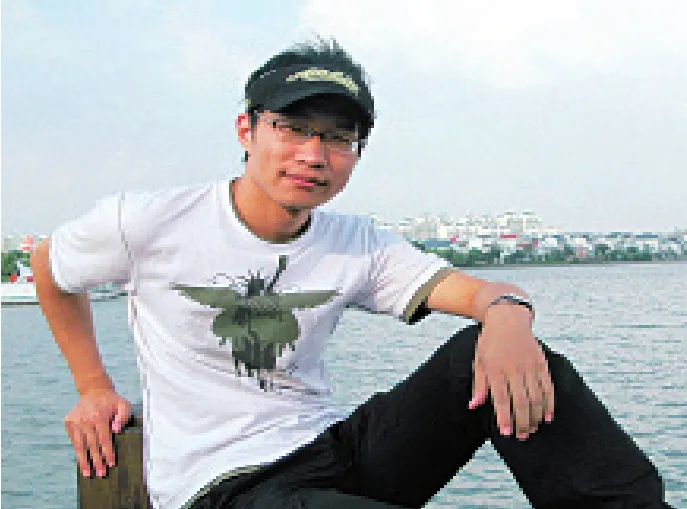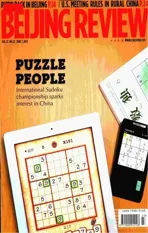Food Safety Warrior
2012-10-14graduatestudentbecomesthelatestonlinephenomenonwithhisInternetdatabaseofproblematicfoodByLiLi
A graduate student becomes the latest online phenomenon with his Internet database of problematic food By Li Li
Food Safety Warrior
A graduate student becomes the latest online phenomenon with his Internet database of problematic food By Li Li

RiSK ALERt:Zhi Chu Chuang Wai,a food safety informationsharing site,has drawn great attention in China amid repeated food safety scandals
Wu Heng, a 27-year-old postgraduate student in historical geography at Fudan University in Shanghai,never expected the food safety informationsharing website he created a year ago would go viral as it did in May. On May 11 alone the site received 404,000 visits, compared with a daily average of 10,000 at its inception.
The website contains a 10-million-characterlong paper authored by Wu on China’s food safety situation and a map of China with regions in different colors to indicate food safety hazard levels between 2004 and 2011.
The title of the paper is “Exchanging Feces to Eat: Food Safety Situation of China (2004-11).” According to Wu, “exchanging feces to eat” indicates that everybody living in a corrupt food supply chain, including suppliers of problematic food themselves, would become the victim of someone else’s wrongdoing.
After a major scandal related to the use of waste leather scraps to produce the gelatin used for drug capsules was exposed by the media in early April, Wu wrote on his website that the paper he wrote one year ago was still relevant since there had been almost no improvement in systematic monitoring.
“An author should take his or her article’s lasting relevance as the highest compliment while my feelings are deep regret and helplessness,” Wu said.
Wu’s creation, Zhi Chu Chuang Wai(www.zccw.info), which means “throw it out of the window,” was inspired by his own suspicious food poisoning experience. Wu used to order braised beef on rice as a takeaway meal almost every day at the low price of less than 10 yuan ($1.58) per helping from an eatery next to his university. In April 2011 Wu, who repeatedly brushed off his roommate’s concerns about the quality of the beef,was startled to read a news report about the widespread use of a potentially harmful additive that lends pork the taste and appearance of beef. It was only then that Wu decided to launch his own campaign to heighten public awareness of problematic foods.
The name of Wu’s website came from the late U.S. President Theodore Roosevelt’s reaction to problematic food. After reading a detailed portrayal of the unsanitary conditions and labor exploitation in Chicago’s meat-packing industry in Upton Sinclair’s bookThe Jungle,the president reportedly threw his breakfast sausage out the window. Roosevelt later invited the author to the White House and launched an investigation into the appalling conditions described.Legislation followed.
In two months, Wu and 34 volunteers he recruited through the Internet combed the Web to fi nd all reports on problematic foods from reliable sources since 2004 and set up a database for the website. It went online last June.
Wu said that within 17 days he and the volunteers read through more than 17,000 news reports of food safety scandals and found problems everywhere.
At the end of the research, more than 2,800 entries were put into the database, which can be searched by using the locations of the incidents or types of hazards, such as expiry dates, illegal additives, unlicensed producers,poor hygiene, and poor packaging quality.

A thiNKER AND DoER: Wu heng at the campus of Fudan University
Adopting an approach similar to Wikipedia.org, Wu’s website allows visitors to add new links to food safety news to its database without registration. The website’s volunteers will verify all contributions later and can only delete irrelevant, unreliable or repeated entries.
Learning from the Darwin Awards, a tongue-in-cheek honor created to recognize individuals who contribute to human evolution by putting themselves unnecessarily in life-threatening situations, Wu set up a Darwin Award of Chinese Foods for the worst food scandal on the homepage of his website. Website visitors can cast a vote from 10 short-listed stories and a cash prize of 1.4 yuan ($0.22) is presented to the fi rst reporter of a food scandal. The token 1.4 yuan prize will be awarded because 1.4 sounds like the characters for “dying together” in Mandarin Chinese.
“All of us will eventually be killed by these harmful foods unless everyone steps forward and speaks out,” Wu said.
Independent operation
Wu pays the website’s 600-yuan ($94.50) annual server usage bill out of his own pocket.As the website became more popular, Wu said that he was contacted by investors and companies seeking partnerships. However,he has declined all of their proposals because he believes the website must remain noncommercial.
Wu, who is about to graduate from Fudan University in June, doesn’t want a career related to food safety and has rejected a job offer from a Shenzhen-based food testing company. Instead, he plans to study for a doctor’s degree in historical geography.
Without any training in food safety, Wu said that his goal in establishing the website is simple enough: He hopes to expose and shame problematic food manufacturers and arouse public attention. “Many people are like frogs in warm water,” he said. “They don’t care about repeated food safety scandals, even if they are eating tainted food.”
According to Wu, he has been receiving anonymous e-mails inquiring about the price of deleting one unfavorable report link. At a recent meeting with five volunteers, Wu deprived himself of the power to delete an entry.
“The power to verify new entries should never be entrusted with one person as absolute power corrupts absolutely,” Wu told theBeijing Times. He said a sound monitoring system should be established.
Wu has remained cautious about the site’s development. One of his friends once advised him to add a new function that would allow users to search for food safety scandals by company or brand name. Wu eventually rejected the idea on the ground that it might be unfair to these companies without asking them for their side of story.
The website functions as an informationsharing platform, so it can be involved in reputation infringement cases under certain conditions, said Si Weijiang, a Shanghaibased lawyer. And although the website only re-posts news reports from other media, Si warned that enterprises have the right to sue it if the reports are groundless.
However, Wu refuses to pull negative reports on companies off his website even after the problematic practice is abandoned, saying that consumers should be alerted and companies should pay a price for their wrongdoing.Wu said that when the food safety claims in some news reports proved inaccurate or exaggerated later, his team would delete the reports. Wu’s team is considering opening a false alarm section for reports denying earlier false reports.
Government support
In 2011, Wu was invited to a seminar on food safety held by the Chinese Academy of Governance as a representative of consumers.More than 30 heads of quality supervision of local governments participated in the seminar.
Wu referred to this opportunity to talk with quality supervision officials a “positive interaction.” “Food safety problems cannot be solved by one person or one policy. My invitation at least proves that of fi cials are willing to listen to the opinions of ordinary consumers,” Wu said.
On May 15, nine officials from the Shanghai Food Safety Office met with Wu and applauded his spirit of social service and encouraged him to carry on the good work.At the two-hour meeting, Wu showed the offi cials selected comments on his website from netizens.
Yan Zuqiang, director of the office, assured Wu that his agency is willing to provide any necessary support and professional assistance for the website when necessary.
The officials also asked Wu to help promote the office’s newly opened 12331 hotline dedicated to hearing all inquiries and complaints about food safety. The reward for a whistleblower is up to 200,000 yuan($31,503). During the first month of the hotline’s operation in April, it received a total of 4,160 calls, according to the Shanghai Food Safety Of fi ce.
When asked to give an overall evaluation of China’s food safety situation byChina Youth Daily, Wu is prudently optimistic. “I think it’s both the worst time and the best time. It’s the worst time because food safety problems happen almost everywhere in the country to all kinds of food. It’s the best time because these problems have been reported by the media. Letting people know what’s happening is the fi rst step toward solving the problem.”
